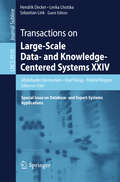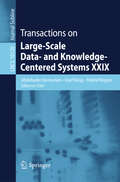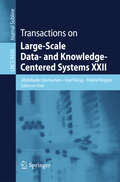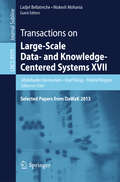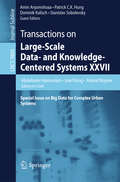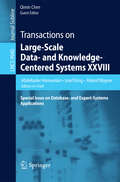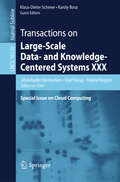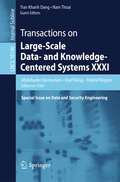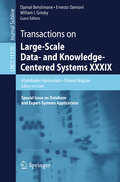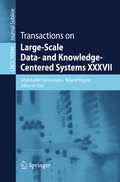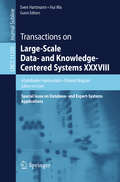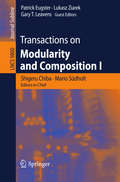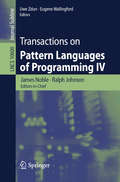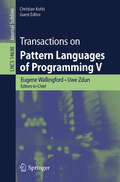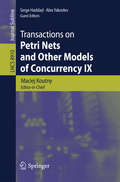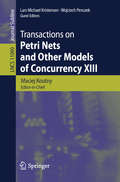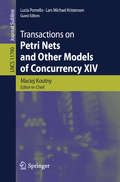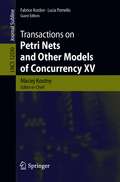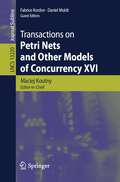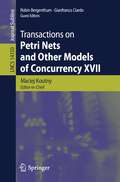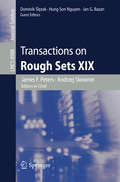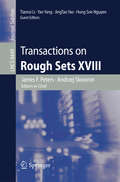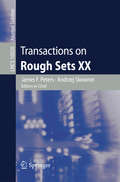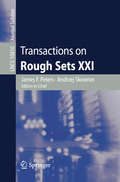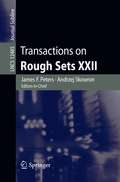- Table View
- List View
Transactions on Large-Scale Data- and Knowledge-Centered Systems XXIV
by Abdelkader Hameurlain Josef Küng Roland Wagner Hendrik Decker Lenka Lhotska Sebastian LinkThis, the24th issue of Transactions on Large-Scale Data- and Knowledge-Centered Systems,contains extended and revised versions of seven papers presented at the 25thInternational Conference on Database and Expert Systems Applications, DEXA2014, held in Munich, Germany, in September 2014. Following the conference, andtwo further rounds of reviewing and selection, six extended papers and oneinvited keynote paper were chosen for inclusion in this special issue. Topicscovered include systems modeling, similarity search, bioinformatics, datapricing, k-nearest neighbor querying, database replication, and dataanonymization.
Transactions on Large-Scale Data- and Knowledge-Centered Systems XXIX
by Abdelkader Hameurlain Josef Küng Roland WagnerThe LNCS journal Transactions on Large-Scale Data- and Knowledge-Centered Systems focuses on data management, knowledge discovery, and knowledge processing, which are core and hot topics in computer science. Since the 1990s, the Internet has become the main driving force behind application development in all domains. An increase in the demand for resource sharing across different sites connected through networks has led to an evolution of data- and knowledge-management systems from centralized systems to decentralized systems enabling large-scale distributed applications providing high scalability. Current decentralized systems still focus on data and knowledge as their main resource. Feasibility of these systems relies basically on P2P (peer-to-peer) techniques and the support of agent systems with scaling and decentralized control. Synergy between grids, P2P systems, and agent technologies is the key to data- and knowledge-centered systems in large-scale environments. This, the 29th issue of Transactions on Large-Scale Data- and Knowledge-Centered Systems, contains four revised selected regular papers. Topics covered include optimization and cluster validation processes for entity matching, business intelligence systems, and data profiling in the Semantic Web.
Transactions on Large-Scale Data- and Knowledge-Centered Systems XXV
by Abdelkader Hameurlain Josef Küng Roland WagnerThis, the 25th issue of Transactions on Large-Scale Data- and Knowledge-Centered Systems, contains five fully revised selected papers focusing on data and knowledge management systems. Topics covered include a framework consisting of two heuristics with slightly different characteristics to compute the action rating of data stores, a theoretical and experimental study of filter-based equijoins in a MapReduce environment, a constraint programming approach based on constraint reasoning to study the view selection and data placement problem given a limited amount of resources, a formalization and an approximate algorithm to tackle the problem of source selection and query decomposition in federations of SPARQL endpoints, and a matcher factory enabling the generation of a dedicated schema matcher for a given schema matching scenario.
Transactions on Large-Scale Data- and Knowledge-Centered Systems XXVI
by Abdelkader Hameurlain Josef Küng Roland Wagner Ladjel Bellatreche Mukesh MohaniaThe LNCS journal Transactions on Large-Scale Data- and Knowledge-Centered Systems focuses on data management, knowledge discovery, and knowledge processing, which are core and hot topics in computer science. Since the 1990s, the Internet has become the main driving force behind application development in all domains. An increase in the demand for resource sharing across different sites connected through networks has led to an evolution of data- and knowledge-management systems from centralized systems to decentralized systems enabling large-scale distributed applications providing high scalability. Current decentralized systems still focus on data and knowledge as their main resource. Feasibility of these systems relies basically on P2P (peer-to-peer) techniques and the support of agent systems with scaling and decentralized control. Synergy between grids, P2P systems, and agent technologies is the key to data- and knowledge-centered systems in large-scale environments. This volume, the 26th issue of Transactions on Large-Scale Data- and Knowledge-Centered Systems, focuses on Data Warehousing and Knowledge Discovery from Big Data, and contains extended and revised versions of four papers selected as the best papers from the 16th International Conference on Data Warehousing and Knowledge Discovery (DaWaK 2014), held in Munich, Germany, during September 1-5, 2014. The papers focus on data cube computation, the construction and analysis of a data warehouse in the context of cancer epidemiology, pattern mining algorithms, and frequent item-set border approximation.
Transactions on Large-Scale Data- and Knowledge-Centered Systems XXVII
by Abdelkader Hameurlain Josef Küng Roland Wagner Patrick C. K. Hung Amin Anjomshoaa Dominik Kalisch Stanislav SobolevskyThis, the 27th issue of Transactions on Large-Scale Data- and Knowledge-Centered Systems, contains extended and revised versions of 12 papers presented at the Big Data and Technology for Complex Urban Systems symposium, held in Kauai, HI, USA in January 2016. The papers explore the use of big data in complex urban systems in the areas of politics, society, commerce, tax, and emergency management.
Transactions on Large-Scale Data- and Knowledge-Centered Systems XXVIII
by Abdelkader Hameurlain Josef Küng Roland Wagner Qimin ChenThis, the 28th issue of Transactions on Large-Scale Data- and Knowledge-Centered Systems, contains extended and revised versions of six papers presented at the 26th International Conference on Database- and Expert-Systems Applications, DEXA 2015, held in Valencia, Spain, in September 2015. Topics covered include efficient graph processing, machine learning on big data, multistore big data integration, ontology matching, and the optimization of histograms for the Semantic Web.
Transactions on Large-Scale Data- and Knowledge-Centered Systems XXX
by Klaus-Dieter Schewe Abdelkader Hameurlain Josef Küng Roland Wagner Karoly BosaThis, the 30th issue of Transactions on Large-Scale Data- and Knowledge-Centered Systems, contains six in-depth papers focusing on the subject of cloud computing. Topics covered within this context include cloud storage, model-driven development, informative modeling, and security-critical systems.
Transactions on Large-Scale Data- and Knowledge-Centered Systems XXXI
by Abdelkader Hameurlain Josef Küng Roland Wagner Tran Khanh Dang Nam ThoaiThe LNCS journal Transactions on Large-Scale Data- and Knowledge-Centered Systems focuses on data management, knowledge discovery, and knowledge processing, which are core and hot topics in computer science. Since the 1990s, the Internet has become the main driving force behind application development in all domains. An increase in the demand for resource sharing across different sites connected through networks has led to an evolution of data- and knowledge-management systems from centralized systems to decentralized systems enabling large-scale distributed applications providing high scalability. Current decentralized systems still focus on data and knowledge as their main resource. Feasibility of these systems relies basically on P2P (peer-to-peer) techniques and the support of agent systems with scaling and decentralized control. Synergy between grids, P2P systems, and agent technologies is the key to data- and knowledge-centered systems in large-scale environments. This, the 31st issue of Transactions on Large-Scale Data- and Knowledge-Centered Systems, contains six revised selected papers from the 2nd International Conference on Future Data and Security Engineering, FDSE 2015, and the 9th International Conference on Advanced Computing and Applications, ACOMP 2015, which were held in Ho Chi Minh City, Vietnam, in November 2015. Topics covered include big data analytics, data models and languages, security and privacy, complex business services, and cloud data management.
Transactions on Large-Scale Data- and Knowledge-Centered Systems XXXIX: Special Issue on Database- and Expert-Systems Applications (Lecture Notes in Computer Science #11310)
by Abdelkader Hameurlain Roland Wagner Djamal Benslimane Ernesto Damiani William I. GroskyThis, the 39th issue of Transactions on Large-Scale Data- and Knowledge-Centered Systems, contains extended and revised versions of seven papers selected from the 37 contributions presented at the 28th International Conference on Database and Expert Systems Applications, DEXA 2017, held in Lyon, France, in August 2017. Topics covered include knowledge bases, clustering algorithms, parallel frequent itemset mining, model-driven engineering, virtual machines, recommendation systems, and federated SPARQL query processing.
Transactions on Large-Scale Data- and Knowledge-Centered Systems XXXVII (Lecture Notes in Computer Science #10940)
by Abdelkader Hameurlain Roland WagnerThis, the 37th issue of Transactions on Large-Scale Data- and Knowledge-Centered Systems, contains five revised selected regular papers. Topics covered include data security in clouds, privacy languages, probabilistic modelling in linked data integration, business intelligence based on multi-agent systems, collaborative filtering, and prediction accuracy.
Transactions on Large-Scale Data- and Knowledge-Centered Systems XXXVIII: Special Issue on Database- and Expert-Systems Applications (Lecture Notes in Computer Science #11250)
by Abdelkader Hameurlain Roland Wagner Sven Hartmann Hui MaThis, the 38th issue of Transactions on Large-Scale Data- and Knowledge-Centered Systems, contains extended and revised versions of six papers selected from the 68 contributions presented at the 27th International Conference on Database and Expert Systems Applications, DEXA 2016, held in Porto, Portugal, in September 2016. Topics covered include query personalization in databases, data anonymization, similarity search, computational methods for entity resolution, array-based computations in big data analysis, and pattern mining.
Transactions on Modularity and Composition I
by Shigeru Chiba Mario Südholt Patrick Eugster Lukasz Ziarek Gary T. LeavensThe LNCS Transactions on Modularity and Composition are devoted to all aspects of software modularity and composition methods, tools, and techniques, covering requirement analysis, design, implementation, maintenance, and evolution. The focus of the journal also includes modelling techniques, new paradigms and languages, development tools, measurement, novel verification and testing approaches, theoretical foundations, and understanding interactions between modularity and composition. This, the first issue of the Transactions on Modularity and Composition, consists of two sections. The first one, guest edited by Patrick Eugster, Mario S#65533;dholt, and Lukasz Ziarek, is entitled "Aspects, Events, and Modularity" and includes papers focusing on context-oriented software development, specifications for even-based systems, and development of modular software. The second section, guest edited by Gary T. Leavens, contains journal versions of selected papers from Modularity 2015, which was held in March 2015, in Fort Collins, Colorado, USA. Topics covered by the papers in this section include software unbundling, layer activation in context-oriented programming, modular reasoning in event-based languages, and dynamic dispatch for method contracts using abstract predicates.
Transactions on Pattern Languages of Programming IV (Lecture Notes in Computer Science #10600)
by Ralph Johnson Uwe Zdun James Noble Eugene WallingfordThe Transactions on Pattern Languages of Programming subline aims to publish papers on patterns and pattern languages as applied to software design, development, and use, throughout all phases of the software life cycle, from requirements and design to implementation, maintenance and evolution. The primary focus of this LNCS Transactions subline is on patterns, pattern collections, and pattern languages themselves. The journal also includes reviews, survey articles, criticisms of patterns and pattern languages, as well as other research on patterns and pattern languages. This book, the third volume in the Transactions on Pattern Languages of Programming series, presents five papers that have been through a careful peer review process involving both pattern experts and domain experts. The papers present various pattern languages and a study of applying patterns and represent some of the best work that has been carried out in design patterns and pattern languages of programming over the last few years.
Transactions on Pattern Languages of Programming V (Lecture Notes in Computer Science #14630)
by Uwe Zdun Eugene Wallingford Christian KohlsThe Transactions on Pattern Languages of Programming subline aims to publish papers on patterns and pattern languages as applied to software design, development, and use, throughout all phases of the software life cycle, from requirements and design to implementation, maintenance and evolution. The primary focus of this LNCS Transactions subline is on patterns, pattern collections, and pattern languages themselves. The journal also includes reviews, survey articles, criticisms of patterns and pattern languages, as well as other research on patterns and pattern languages. This book, the fifth volume in the Transactions on Pattern Languages of Programming series, includes papers on patterns and pattern languages for engineering specific kinds of application and for improving processes, as well as papers on the discovery, validation, and systemic use of patterns more broadly.
Transactions on Petri Nets and Other Models of Concurrency IX
by Serge Haddad Maciej Koutny Alex YakovlevThese Transactions publish archival papers in the broad area of Petri nets and other models of concurrency, ranging from theoretical work to tool support and industrial applications. ToPNoC issues are published as LNCS volumes, and hence are widely distributed and indexed. This Journal has its own Editorial Board which selects papers based on a rigorous two-stage refereeing process. ToPNoC contains:- Revised versions of a selection of the best papers from workshops and tutorials at the annual Petri net conferences- Special sections/issues within particular subareas (similar to those published in the Advances in Petri Nets series)- Other papers invited for publication in ToPNoC- Papers submitted directly to ToPNoC by their authorsThe 9th volume of ToPNoC contains revised and extended versions of a selection of the best workshop papers presented at the 34th International Conference on Application and Theory of Petri Nets and Concurrency (Petri Nets 2013) and the 13th International Conference on Application of Concurrency to System Design (ACSD 2013). It also contains one paper submitted directly to ToPNoC. The 8 papers cover a diverse range of topics including model checking and system verification, refinement and synthesis, foundational work on specific classes of Petri nets, and innovative applications of Petri nets and other models of concurrency. Application areas covered in this volume are: biological systems, communication protocols, business processes, distributed systems, and multi-agent systems. Thus, this volume gives a good view of ongoing concurrent systems and Petri nets research.
Transactions on Petri Nets and Other Models of Concurrency XIII (Lecture Notes in Computer Science #11090)
by Maciej Koutny Wojciech Penczek Lars Michael KristensenThe 13th volume of ToPNoC contains revised and extended versions of a selection of the best workshop papers presented at the 38th International Conference on Application and Theory of Petri Nets and Concurrency, Petri Nets 2017, and the 17th International Conference on Application of Concurrency to System Design, ACSD 2017. The 9 papers cover a diverse range of topics including model checking and system verification, refinement, and synthesis; foundational work on specific classes of Petri nets; and innovative applications of Petri nets and other models of concurrency. Application areas covered in this volume are: fault-tolerance, service composition, databases, communication protocols, business processes, and distributed systems. Thus, this volume gives a good overview of ongoing research on concurrent systems and Petri nets.
Transactions on Petri Nets and Other Models of Concurrency XIV (Lecture Notes in Computer Science #11790)
by Maciej Koutny Lars Michael Kristensen Lucia PomelloThe 14th volume of ToPNoC contains revised and extended versions of a selection of the best workshop and tutorial papers presented at the 39th International Conference on Application and Theory of Petri Nets and Concurrency, Petri Nets 2018, and the 18th International Conference on Application of Concurrency to System Design, ACSD 2018.The 10 papers cover a diverse range of topics including model checking and system verification, refinement, and synthesis; foundational work on specific classes of Petri nets; and innovative applications of Petri nets and other models of concurrency. Application areas covered in this volume are: process mining, verification, formal semantics, communication protocols, business processes, distributed systems, and net synthesis. Thus, this volume gives a good overview of ongoing research on concurrent systems and Petri nets.
Transactions on Petri Nets and Other Models of Concurrency XV (Lecture Notes in Computer Science #12530)
by Fabrice Kordon Maciej Koutny Lucia PomelloThe 15th volume of ToPNoC contains revised and extended versions of a selection of the best workshop and tutorial papers presented at the 40th International Conference on Application and Theory of Petri Nets and Concurrency, Petri Nets 2019, and the 19th International Conference on Application of Concurrency to System Design, ACSD 2019. The papers cover a diverse range of topics including model checking and system verification, refinement and synthesis; foundational work on specific classes of Petri nets; and innovative applications of Petri nets and other models of concurrency. Application areas covered in this volume are: process mining, verification, formal semantics, communication protocols, business processes, distributed systems, and net synthesis. Thus, this volume gives a good overview of ongoing research on concurrent systems and Petri nets.
Transactions on Petri Nets and Other Models of Concurrency XVI (Lecture Notes in Computer Science #13220)
by Fabrice Kordon Maciej Koutny Daniel MoldtThe 16th volume of ToPNoC contains revised and extended versions of a selection of the best workshop and tutorial papers presented at the 41st International Conference on Application and Theory of Petri Nets and Concurrency, Petri Nets 2020, and the 20th International Conference on Application of Concurrency to System Design, ACSD 2020.The papers cover a diverse range of topics including model checking and system verification, refinement and synthesis; foundational work on specific classes of Petri nets; and innovative applications of Petri nets and other models of concurrency. Application areas covered in this volume are: process mining, verification, formal semantics, distributed simulations, business processes, distributed systems, and net synthesis. Thus, this volume gives a good overview of ongoing research on concurrent systems and Petri nets.
Transactions on Petri Nets and Other Models of Concurrency XVII (Lecture Notes in Computer Science #14150)
by Maciej Koutny Gianfranco Ciardo Robin BergenthumTransactions on Petri Nets and Other Models of Concurrency (ToPNoC) XVII. These Transactions publish archival papers in the broad area of Petri nets and other models of concurrency, ranging from theoretical work to tool support and industrial applications. ToPNoC issues are published as LNCS volumes, and hence are widely distributed and indexed. This Journal has its own Editorial Board which selects papers based on a rigorous two-stage refereeing process. ToPNoC contains: – Revised versions of a selection of the best papers from workshops and tutorials at the annual Petri net conferences – Special sections/issues within particular subareas (similar to those published in the Advances in Petri Nets series) – Other papers invited for publication in ToPNoC – Papers submitted directly to ToPNoC by their authors The 17th volume of ToPNoC contains revised and extended versions of a selection of the best workshop and tutorial papers presented at the 43rd International Conference on Application and Theory of Petri Nets and Concurrency, Petri Nets 2022. The papers cover a diverse range of topics including model checking and system verification, refinement and synthesis, foundational work on specific classes of Petri nets, and innovative applications of Petri nets and other models of concurrency. Application areas covered in this volume are: process mining, verification, formal semantics, distributed simulations, business processes, distributed systems, and net synthesis. Thus, this volume gives a good overview of ongoing research on concurrent systems and Petri nets.
Transactions on Rough Sets XIX
by James F. Peters Andrzej Skowron Hung Son Nguyen Dominik Ślȩzak Jan G. BazanThe LNCS journal Transactions on Rough Sets is devoted to the entire spectrum of rough sets related issues, from logical and mathematical foundations, through all aspects of rough set theory and its applications, such as data mining, knowledge discovery, and intelligent information processing, to relations between rough sets and other approaches to uncertainty, vagueness, and incompleteness, such as fuzzy sets and theory of evidence. Volume XIX in the series focuses on the current trends and advances in both the foundations and practical applications of rough sets. It contains 7 extended and revised papers originally presented at the Workshop on Rough Set Applications, RSA 2012, held in Wroclaw, Poland, in September 2012. In addition, the book features 3 contributions in the category of short surveys and monographs on the topic.
Transactions on Rough Sets XVIII (Lecture Notes in Computer Science #8449)
by James F. Peters, Andrzej Skowron, Tianrui Li, Yan Yang, JingTao Yao and Hung Son NguyenThe LNCS journal Transactions on Rough Sets is devoted to the entire spectrum of rough sets related issues, from logical and mathematical foundations, through all aspects of rough set theory and its applications, such as data mining, knowledge discovery, and intelligent information processing, to relations between rough sets and other approaches to uncertainty, vagueness, and incompleteness, such as fuzzy sets and theory of evidence.Volume XVIII includes extensions of papers from the Joint Rough Set Symposium (JRS 2012), which was held in Chengdu, China, in August 2012. The seven papers that constitute this volume deal with topics such as: rough fuzzy sets, intuitionistic fuzzy sets, multi-granulation rough sets, decision-theoretic rough sets, three-way decisions and their applications in attribute reduction, feature selection, overlapping clustering, data mining, cost-sensitive learning, face recognition, and spam filtering.
Transactions on Rough Sets XX
by James F. Peters Andrzej SkowronThe LNCS journal Transactions on Rough Sets is devoted to the entire spectrum of rough sets related issues, from logical and mathematical foundations, through all aspects of rough set theory and its applications, such as data mining, knowledge discovery, and intelligent information processing, to relations between rough sets and other approaches to uncertainty, vagueness, and incompleteness, such as fuzzy sets and theory of evidence. Volume XX in the series is a continuation of a number of research streams that have grown out of the seminal work of Zdzislaw Pawlak during the first decade of the 21st century.
Transactions on Rough Sets XXI (Lecture Notes in Computer Science #10810)
by James F. Peters Andrzej SkowronThe LNCS journal Transactions on Rough Sets is devoted to the entire spectrum of rough sets related issues, from logical and mathematical foundations, through all aspects of rough set theory and its applications, such as data mining, knowledge discovery, and intelligent information processing, to relations between rough sets and other approaches to uncertainty, vagueness, and incompleteness, such as fuzzy sets and theory of evidence. Volume XXI in the series is a continuation of a number of research streams that have grown out of the seminal work of Zdzislaw Pawlak during the first decade of the 21st century.
Transactions on Rough Sets XXII (Lecture Notes in Computer Science #12485)
by James F. Peters Andrzej SkowronThe LNCS journal Transactions on Rough Sets is devoted to the entire spectrum of rough sets related issues, from logical and mathematical foundations, through all aspects of rough set theory and its applications, such as data mining, knowledge discovery, and intelligent information processing, to relations between rough sets and other approaches to uncertainty, vagueness, and incompleteness, such as fuzzy sets and theory of evidence. Volume XXII in the series is a continuation of a number of research streams that have grown out of the seminal work of Zdzislaw Pawlak during the first decade of the 21st century.
